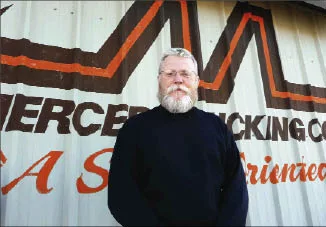
Home » Soaring diesel prices took truckers down rough road
Soaring diesel prices took truckers down rough road
Fuel-efficiency efforts, surcharges help offset sharply higher costs

November 20, 2008
The dramatic increase in diesel prices earlier this year has hurt trucking companies here and nationally—with the potential of increasing the cost of everything transported by truck, including food, retail products, and manufactured goods.
Trucking industry representatives say they are taking every step they can to run more fuel-efficient operations, even though diesel prices eased recently.
"We're trying to get every load we can to get the volume up," says Steven Hanning, owner of Spokane-based Mercer Trucking Co. While he's encouraged by the recent downturn in prices, he questions how long lower prices will prevail.
After 33 years in the trucking business, Hanning says, "This has probably been the toughest year I've been through. Profit margins are just difficult as all get out," he says, for Mercer's 41-truck and 58-employee operation.
The American Trucking Association (ATA), of Arlington, Va., says that even though the trucking industry is doing what it can to reduce fuel consumption, such as by lowering truck speeds, reducing idling, and trying to keep equipment well maintained, those steps don't begin to offset the rising fuel cost. Industry representatives say, though, that fuel-related surcharges they've implemented have helped some as well.
Nationally, the retail price of diesel reached $4.70 per gallon in July, says the federal Energy Information Administration, the independent statistical and analytical agency within the Department of Energy. That was up from $2.87 per gallon in July 2007. In a bit of good news for truckers, prices have gone down a bit, reaching $4.02 per gallon in September, and falling further since then.
Still, Mercer's fuel costs shot up 64 percent for the first nine months of 2008, compared with the year-earlier period, Hanning says, adding, "That's almost a million dollars more in fuel this year."
He says, "You've got to budget every single department, watch every penny you spend, and stick to the budgets. We've got to run lean, be smart, not make any mistakes, have good safe drivers, and we should be OK."
He's now more than ever watching spending closely, he says. After buying 10 trucks over the last year, Hanning says he doesn't plan on buying any more next year.
"Nobody wants to buy any new equipment," he says. "We just need to get ourselves stabilized."
The industry should get going again in the spring, he predicts, but not before the slower winter takes its toll on a few trucking companies.
"Tonnage will be up because there will be more freight than trucks," reflecting the number of truckers that have closed their doors, he says. Mercer's tonnage this year is up about 20 percent over 2007, he says.
Nationally, however, ATA says freight volumes are weakening.
Francis McGee, general manager at James J. Williams, of Spokane, a subsidiary of Spokane-based Trans-System Inc., says, "We're all experiencing a large slowdown in business levels."
McGee says, though, that 2009 doesn't look good at all, because the weaker economy will curtail freight demand. "It looks pretty bleak," he says.
He says he judges business by how many loads James J. Williams hauls each week, and that number has fallen to about 240 per week from 300 per week in the last year, decreasing revenue in the process.
Lom Hutchins, vice president of Spokane-based Produce Supply Express Inc., says, "It's not a time to expand. It's been difficult times to operate."
The company will spend about twice as much for fuel this year as it did in 2007, he says. Like other trucking industry representatives here, he says the best way to offset high diesel prices is for truckers to levy a fuel surcharge.
As bad as it has been, he says, "Last year was more difficult."
During 2007 there were more carriers operating, cutting into the amount of freight available to be hauled by Produce Supply Express, he says.
"(Competitors) would haul the freight cheaper than we would and eat it up," he says. "They would operate at a loss just to stay busy, and that's a good way to go out of business."
The skyrocketing price of fuel reduced the number of carriers, and the tighter credit market has contributed to that reduction, he says.
Produce Supply Express is working to be more efficient, he says, and because of that focus, the company's tonnage is up about 4 percent this year over last year even though the number of miles its trucks have traveled is down. The company is hauling fewer loads, and its trucks are full more frequently, he says.
"Our revenues are similar to last year, we're just using fewer assets to do it," he says.
To be more fuel efficient, he says, the company has installed auxiliary power units in all its trucks during the last 18 to 20 months. The units provide heating and air conditioning inside the trucks, while the engine is turned off. They cut down idling time and the number of hours engines run to reduce wear.
James J. Williams, McGee says, has taken a number of steps to be more fuel efficient, such as improving the physical alignment of its trucks and trailers, reducing idling, and buying tires that provide better mileage.
Latest News
Related Articles

_web.webp?t=1769673727)
_web.webp?t=1769673728)
_web.webp?t=1769673735)
